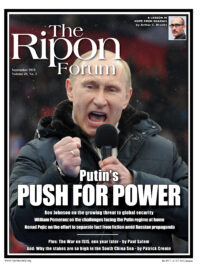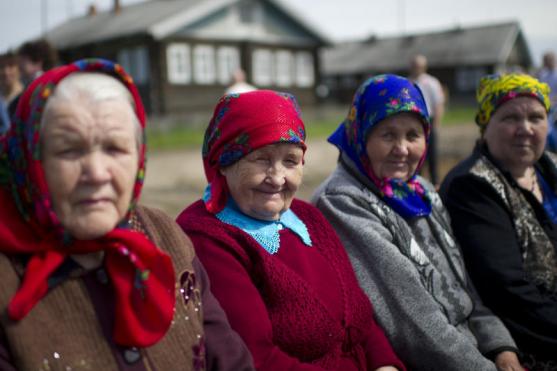
The renewed clashes in eastern Ukraine in mid-August confirm once again that the Russia-Ukraine crisis is anything but frozen. Indeed, while the level of violence stabilized in the aftermath of the February 2015 Minsk II agreement, the shooting and dying on all sides never stopped.
The new round of fighting raises the immediate question whether the region is witnessing an escalation of the crisis, or if sufficient flexibility and restraint exists amongst the parties to return to the Minsk II process, unsatisfactory as it is. Yet while the clock is ticking on multiple fronts, it is Russian president Vladimir Putin who potentially faces the most significant time pressures.
Putin has relished being unpredictable throughout the conflict, but even he, by now, realizes that the Ukraine crisis has not gone according to his timetable. There has been no decisive military victory, as occurred in Georgia in 2008. Moreover, unlike the 2009 economic crisis, the price of oil has not dramatically recovered, nor does Russia possess the same deep financial reserves to prop up the ruble and prevent a dramatic drop in living standards. Finally, no U.S. politician generously has offered Putin a reset; instead, he has to deal with U.S. and EU sanctions.
Putin has relished being unpredictable throughout the conflict, but even he, by now, realizes that the Ukraine crisis has not gone according to his timetable.
So this current crisis differs significantly from the most recent ones. At the June St. Petersburg Economic Forum, Putin glossed over Russia’s financial problems, but his economic advisors – past and present – openly expressed their concerns about Russia’s future direction. And even though Putin faces no political opposition, he is presiding over a troubled economy that would keep any politician up at night.
What ails the Russian economy? Take your pick. Up until now, Putin has always made sure that pensions keep pace with inflation and are paid in full. Now, because of the collapse in the price of oil and deep recession, that type of money is simply not available. Putin risks alienating Russian pensioners – perhaps his most loyal group of supporters – by no longer providing pensions that are linked to the rate of inflation.
The regions are broke. Indeed, it has been reported that as many as 20 regions technically are in default. Regional governments are responsible for numerous public and social services, and now the federal government will have to pick up the tab at a time of shrinking resources.
Utility rates are going up, naturally hitting poor Russians the hardest. Since Putin is always looking over his shoulder for colored revolutions and potential social unrest, he obviously knows that the recent protests in Armenia were sparked by a rise in utility rates.
The list of problems goes on. The car market was down 30 percent in June, while mortgage lending was down 40 percent during the first five months of 2015. Both reflect a dramatic decline in domestic investment, manufacturing, and consumer demand. Most analysts anticipate at least a 3 percent decrease in GDP in 2015, and the final number may be worse. In June the EU extended its sanctions for another six months, thereby denying Russia access to western financial markets. And Belarus, Russia’s erstwhile trade partner and ally, recently asked for another $3 billion loan to tide it over during difficult times.
Indeed, one has to look hard to find bright spots in the Russian economy. At the St. Petersburg Economic Forum, Putin touted the rise in domestic cheese, butter, and other dairy production, but this increase only occurred because of the food counter-sanctions imposed by Putin in 2014 against western agricultural products. Indeed, Putin has introduced a program of import substitution that sacrifices the principle of comparative advantage – the bulwark of the post-WWII system of international trade – and instead relies on Soviet-style notions of self-sufficiency.
Individually, the above economic problems are not necessarily fatal to the regime, especially since Putin faces no serious political challengers. Nevertheless, a toxic mixture of factors – inflation, declining pensions, a weakening currency, failing regional governments– is currently brewing that could boil over at any time. Putin would have to address any negative public reaction with dwindling economic resources. Moreover, his alternative financial backer – China – is in the midst of its own stock market crash and economic slowdown that may severely limit its ability to come to Russia’s rescue.
Putin risks alienating Russian pensioners – perhaps his most loyal group of supporters – by no longer providing pensions that are linked to the rate of inflation.
Yet despite all these worries, Putin continues to display a high level of confidence. Is this hubris, or does he truly believe that time is on his side? He still is sitting on approximately $350 billion in hard currency reserves to throw at these problems. Those reserves, however, are down significantly from the start of the crisis and will be tapped again to cover the anticipated 2015 budget deficit. He also is a firm believer that what goes down must go up. So there is always the possibility that the price of oil will recover, thereby creating a significantly sunnier economic outlook.
The Ukraine crisis presents other opportunities for Putin as well. The extension of EU sanctions requires unanimity, and he will no doubt continue to sow divisions within Europe to possibly overturn the present sanctions regime when it is next considered in January 2016. Putin would love nothing more than to break the united front between the EU and the United States, and this remains a real possibility the longer the crisis drags on.
Yet to achieve this goal, Russia essentially has been put on a wartime footing. The anti-U.S. rhetoric in the Russian media is pervasive and unrelenting. Military spending remains one of the few areas not subject to budget cuts. The new law on “undesirable” foreign organizations makes it significantly easier to go after the domestic opposition (what little is left of it). Even the import substitution policy is driven by national security concerns and the need for Russia to be free of any dependency on foreign technology and products.
Putin can’t back down from any of these policies without losing face and considerable political leverage, so in the short-term, Putin appears unlikely to change course. Putin admittedly can probably live with the poor implementation of the Minsk II agreement – the low-level military confrontation has created sufficient uncertainty to prevent major foreign investment and Ukraine’s economic revival. Putin also could raise the ante and increase the level of violence in eastern Ukraine, as recently occurred. Such actions, however, run the risk of re-starting the clock on sanctions, something Putin wants to avoid.
So Putin is keeping his options open, probing and provoking to see what comes next. The problem is that as Putin plays for time, time is also working against him, especially on the economic front. And therein lies his dilemma.
William Pomeranz serves as deputy director of the Kennan Institute at the Wilson Center. Any opinions expressed here are the author’s own.





